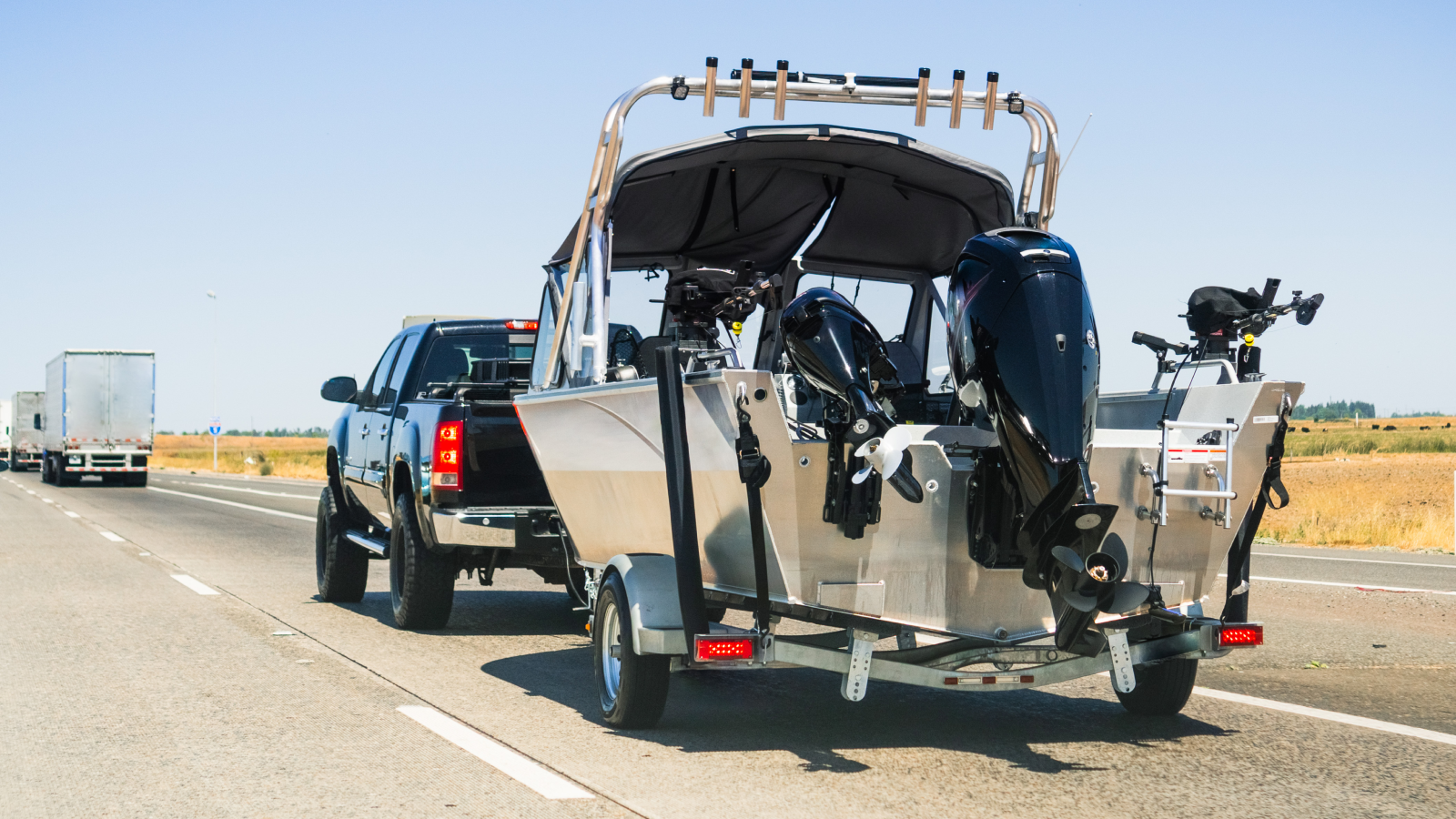Tips for Traveling with Your Boat

There’s nothing quite like the freedom of the open road, especially when you’re heading out for a boating adventure with your vessel in tow. But before you pack up and hit the highway, it’s worth asking: are you and your boat ready for the ride?
Towing can be exciting, but it might also feel a little overwhelming if you’re still learning. From inspecting your trailer and towing gear to understanding what your insurance covers, a smooth journey starts well before you leave the driveway.
Before you start your trip:
Check your towing setup
A solid towing setup is the foundation of a safe trip. Start by confirming your vehicle’s towing capacity by checking the owner’s manual or the manufacturer’s website. Make sure your vehicle can safely handle the combined weight of your boat, trailer, motor, fuel, and any gear on board. Exceeding your vehicle’s towing limit can strain the engine, brakes, and transmission, and may significantly compromise your safety.
Never guess or assume your vehicle’s towing capacity. Overloading isn’t just risky; it can lead to damage that may not be covered by your insurance if improper planning was involved.
Inspect your trailer
- Tires: Check the condition and pressure of all tires, including the spare
- Lights: Ensure all brake lights, turn signals, and tail lights are working properly
- Frame and axle: Look for signs of rust, corrosion, or wear
- Hitch and coupler: Confirm that the hitch and coupler are the correct size/type, securely mounted, and rated for the load you’re towing
Before every trip, walk around your boat trailer to make sure everything is in good shape. This step is always important, but especially if you’re planning a long-distance trip. Catching issues early can save you from major headaches down the road.
Drive safely (and slower than normal)
Driving with your boat in tow isn’t the same as your usual weekend drive, so take it slow, brake earlier than usual, and give yourself some extra room for turns. Driving smooth and steady can help keep you and your boat safe on the road.
Stay legal while towing
Towing safely also means towing legally. In most states, boat trailers must be registered and display a valid license plate. Depending on the trailer’s weight, you may also need working brakes, a breakaway system, and a safety inspection. Laws vary by state, so if you’re planning to tow across state lines, it’s a good idea to review the specific legal requirements ahead of time.
Practice makes perfect
If you’re new to towing, don’t wait until the day of your trip to get comfortable. Take some time to practice driving with your boat trailer in a safe, open area or empty parking lot. Get a feel for how your vehicle handles turns, braking, and reversing with the added weight. Practicing ahead of time can build your confidence and help you avoid surprises on the road or at the boat ramp.
Do a final check before leaving
Take a moment to do one last walk-around. Make sure the boat is securely strapped down, the hitch is locked, safety chains are crossed and connected, all lights are working, and that nothing is loose or likely to shift during transit. Secure or remove any items inside the boat to prevent damage or loss, such as coolers, seat cushions, covers, life jackets, and towels. Remember to remove the drain plug after taking the boat out of the water to prevent water buildup (just don’t forget to put it back in before launching again). Confirm that the trailer jack is raised, the tires are inflated, and the load is balanced. It’s also smart to pack a safety kit with basic tools, first aid supplies, flashlights, gloves, a jack, and any essential documents.
Is towing-related damage covered by your Auto Insurance or Watercraft Insurance?
Many boat owners assume their car insurance covers everything during transport, but that’s not always the case.
Car insurance typically provides liability coverage while towing; meaning if your trailer or boat causes damage to another car or property while attached to your insured vehicle, your policy may help cover the costs. However, damage to your boat or trailer itself may not be included in a standard auto policy.
Watercraft insurance can help cover physical damage to your boat while it’s being towed and may include coverage for incidents like collisions, theft, or weather-related damage. Coverage details vary, so it’s a good idea to check with your insurance agent to understand your coverage in further detail before you leave for any boating trip.
If you’re an Alfa® customer, you can bundle your auto + watercraft policies to save money and simplify your coverages.
The right insurance coverage is your best backup plan
Even with the most careful planning and preparation, the unexpected can still happen on the road. Whether it’s a flat tire on your trailer, a fender bender, or damage to your boat during transit, having the right insurance coverage for both your vehicle and your watercraft can save you time, money, and stress.
Your local Alfa agent can help you find a policy that keeps up with your adventures, no matter what bumps you hit along the way.
All coverages are subject to deductibles and policy limits. This is not an insurance policy. It is intended only to provide a general description of Alfa Insurance® and/or its product lines and services. An actual policy contains the specific details of the deductibles, coverages, conditions and exclusions. Your Alfa® agent can explain the policy and benefits and answer any questions you may have before you buy.